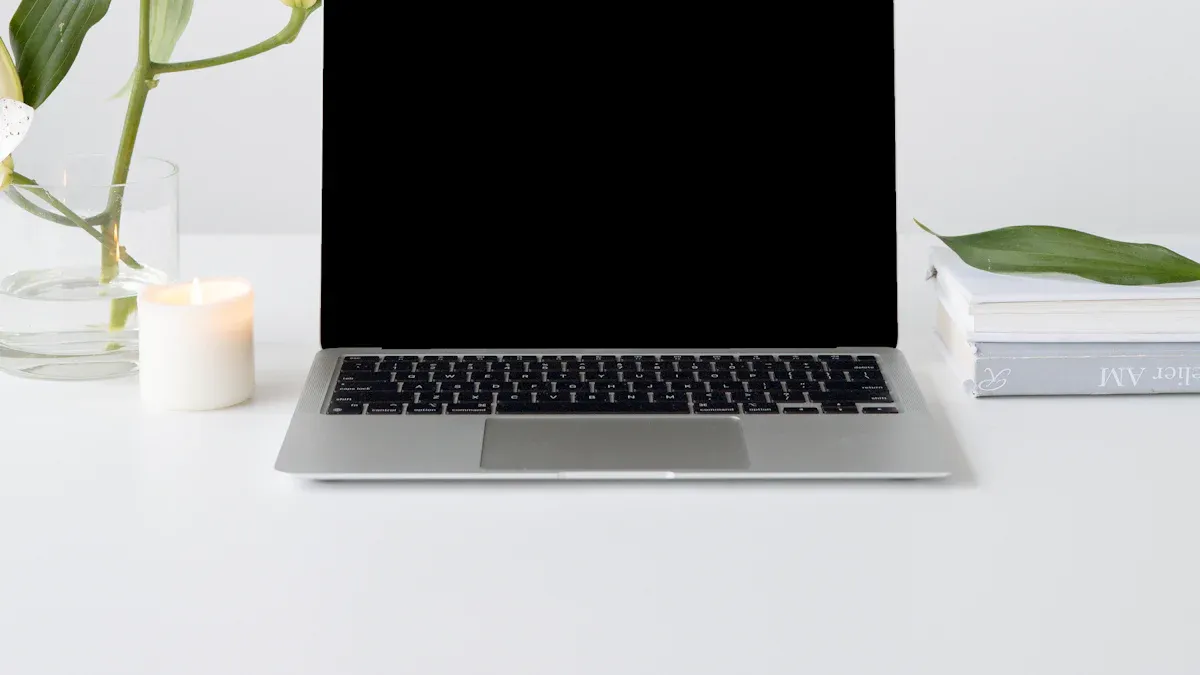
Have you ever thought about why some workspaces feel nicer? Home office feng shui helps you make a workspace that supports your goals. This way of using office feng shui is not magic. You use your choices and small changes to change the energy. This helps set up your space to help you work better and feel good. Studies show that good spaces can help people work better and feel happier. Look at this:
Study |
Findings |
|---|---|
Vohs et al., 2017 |
Good workspaces can really help workers feel better and do better. |
McCoy & Evans, 2014 |
Being around nature at work can make people more creative by 15%. |
Feng shui ideas can help you work better and do well at your job.
A neat and nice-looking office can make work more fun.
Adding things like plants and sunlight can help workers feel healthier and happier.
Moving around at work can help you get more done.
You do not have to change your whole home office. Even one small change with office feng shui can help a lot. Take a minute to look at your workspace. What would you like to make better?
Key Takeaways
Feng shui can make your workspace better. It helps energy move well and helps you get more work done. Small changes can make a big difference.
Put your desk in the command position. This helps you feel safe and in charge. It can help you focus and feel more sure of yourself.
Clean up your workspace often. This lowers stress and helps you think clearly. A neat space helps you work faster and better.
Add things from nature like plants and good lights. This makes your work area healthier and happier. These things can help you feel better and think of new ideas.
Decorate your office with things that inspire you. Personal touches can make your workspace feel friendly and full of energy.
Home Office Feng Shui Basics
Why Feng Shui Matters
You spend a lot of time in your home office, so the way it feels can shape your mood and how well you work. Feng shui principles help you set up your space to support your goals and boost your energy. When you incorporate feng shui, you create a place that feels balanced and welcoming. Feng Shui consultant Anjie Cho says your home office represents your career and can even help you feel more satisfied with your job. (To understand how colors play a crucial role in feng shui and can affect your work environment, see relevant article: How Feng Shui Colors Can Enhance Your Living Space )
Take a look at some important aspects of feng shui in a home office:
Aspect |
Description |
|---|---|
Desk Positioning |
Placing your desk in a commanding position enhances awareness, confidence, and security. |
Balance of Five Elements |
Incorporating wood, metal, water, fire, and earth elements creates a harmonious workspace. |
Natural Light and Air Flow |
Good lighting and fresh air improve physical and mental well-being. |
Color Psychology |
Different colors evoke specific energies that can enhance productivity and focus. |
When you use these ideas, you can feel more focused and less stressed. You might even notice more creative thoughts popping up during your workday.
Key Principles
Feng shui principles focus on creating harmony and letting Qi flow freely. You want your home office to feel open and clear, not crowded or blocked. Here are some key tips to help you get started:
Place your desk so you can see the door. This is called the command position. It gives you a sense of control and helps you feel safe.
Use colors that match your goals. Green can spark creativity, while earthy tones help you stay grounded.
Add plants or natural materials. These bring life into your space and help clean the air.
Keep your wealth corner tidy and bright. The wealth corner is the back left area of your office when you stand at the door. This spot is important for attracting abundance.
Try to incorporate feng shui by balancing the five elements in your décor. This keeps your energy steady and positive.
Don’t forget your wealth corner! Place something meaningful there, like a healthy plant or a symbol of success.
Tip: If you want to boost your focus, keep your wealth corner free from clutter and dust.
When you incorporate feng shui into your home office, you set yourself up for better productivity and well-being. These simple tips can make a big difference in how you feel and work every day.
Declutter and Organize Your Home Office

Clear the Clutter
You might not realize how much clutter can impact the energy flow in your home office. When you see piles of paper, tangled cords, or random items on your desk, your mind feels just as messy. Research from the Princeton University Neuroscience Institute shows that a cluttered environment restricts your brain’s ability to process information. This makes it harder to focus and can even raise your stress levels. Another study found that people with more clutter at home or work reported higher stress and lower well-being. (Explore how adding crystals can complement decluttering to enhance energy flow, see relevant article: How to Use Feng Shui Crystals in Every Room of Your Home )
Let’s make it easier for you to limit clutter and create a workspace that supports a positive flow of energy. Try these simple steps:
Start with a quick audit. Look at everything on your desk and shelves. Ask yourself if you use each item every day, once a week, or almost never.
Remove anything you don’t need. If you haven’t used it in a month, store it away or let it go.
Use labeled trays for your tasks. Have one for “Urgent,” one for “In Progress,” and one for “Archived.” This keeps your work organized and your mind clear.
Schedule a 10-minute tidy-up after lunch. This small habit helps you keep clutter from building up.
Go digital when possible. Organize your files on your computer and use clear naming systems. Try to keep your inbox at zero by the end of each day.
Tip: A clean workspace doesn’t just look good. It helps your mind feel calm and ready to work.
Here’s a quick look at how clutter affects your mind and work:
Evidence |
Description |
|---|---|
Clutter's impact on mental health |
Clutter links to emotional exhaustion and stress, which can harm your health. |
Effects on productivity |
Clutter creates distractions and decision fatigue, making it hard to focus. |
Neurological impact |
Visual clutter tires your brain and drains your energy over time. |
Maintain Flow
Once you clear the clutter, you want to keep the smooth flow of energy in your workspace. Organization is not a one-time job. It’s about building habits that support you every day. When you keep your space tidy, you help optimize energy flow and reduce stress.
Try these organization strategies to maintain a positive flow of energy:
Use vertical space. Install floating shelves or pegboards to keep your desk clear.
Hide cables with adhesive clips or trays under your desk. This keeps your space neat and safe.
Store items you rarely use in drawers or decorative boxes. Only keep daily essentials within reach.
Set up a five-minute nightly reset. Before you finish work, put everything back in its place.
Do a weekly deep clean. Wipe surfaces, dust shelves, and check for items that don’t belong.
Add a touch of color that helps you focus, like blue or green, to support a calm and productive mood.
Note: An organized workspace helps you feel in control and less stressed. You’ll notice fewer distractions and more energy for your work.
Here’s how workspace organization can reduce stress:
Factor |
Description |
|---|---|
Workload |
Too much or too little work can cause stress. |
Lack of Control |
Feeling in control of your space lowers stress. |
Poor Working Conditions |
Messy, uncomfortable spaces increase stress levels. |
Role Ambiguity |
Clear organization helps you know what to do and when. |
Poor Interpersonal Relationships |
A tidy space can improve your mood and how you interact with others. |
When you organize your home office, you don’t just impact the energy flow. You also support your mental clarity and well-being. A tidy, organized space lets you focus on what matters most and keeps your energy high throughout the day.
Feng Shui Office Design: Desk and Furniture Placement
The Command Position
Let’s talk about the command position. This is one of the most important ideas in feng shui office design. When you set up your desk in the command position, you give yourself the best chance to feel confident and in control. Here’s how you do it: Place your desk so you can see the door, but don’t sit directly in line with it. Keep your back against a solid wall. This simple move can change the way you feel at work. (Learn more about strategic placement in your workspace using the Bagua map, see relevant article: Bagua Feng Shui Map explained for easy home energy )
Why does this matter? When you can see who comes in, you feel safer and more aware. You don’t get startled or distracted as easily. A solid wall behind you gives you support. You feel like you have authority in your space. You also get the benefit of Qi, the natural energy that flows into your room. The command position lets you catch this energy and use it to your advantage.
Here’s a quick list to help you remember the key points:
Place your desk so you can see the entrance, but don’t sit right in front of the door.
Keep your back to a solid wall for support.
Avoid sitting with your back to the door or facing a wall.
Tip: If you can’t move your desk, try using a mirror to see the door. This still gives you a sense of control.
When you use the command position, you create a well-designed feng shui office. You feel more secure, focused, and ready to handle anything that comes your way.
Ergonomic Choices
Now, let’s look at how your desk and chair can help you feel better every day. Good feng shui office design is not just about where you put your desk. It’s also about how you sit and what you use. The best feng shui office layout always includes ergonomic furniture. This means your chair and desk fit your body and help you stay comfortable.
Research shows that the right desk and chair can lower your risk of pain and injury. You can work longer and feel better. Here’s a table to show how different furniture choices help your health and support feng shui principles:
Furniture Type |
Contribution to Health and Feng Shui Principles |
|---|---|
Rounded and Curved |
Encourages a harmonious and stress-free environment, allowing energy to circulate freely and reducing stress. |
Natural Materials |
Promotes a calm atmosphere and grounds energy, enhancing overall well-being. |
Thoughtful Placement |
Enhances energy flow, creating a balanced workspace that supports physical comfort and mental clarity. |
When you pick a desk, look for one with smooth edges. Sharp corners can block Qi and make you feel tense. Choose a chair that supports your back and lets your feet rest flat on the floor. If you can, use natural materials like wood or bamboo. These help you feel calm and connected to nature.
Here are some quick tips for ergonomic feng shui office design:
Adjust your chair so your knees are level with your hips.
Keep your desk at a height where your arms rest comfortably.
Place your monitor at eye level to avoid neck strain.
Use a footrest if your feet don’t touch the floor.
Note: A comfortable desk and chair help you focus and keep your energy high all day.
The way you arrange your desk and furniture shapes how you feel and work. Studies show that a good layout can boost your mood and help you get more done. When you combine the command position with ergonomic choices, you create a space that supports your goals and keeps you healthy. This is the heart of the best feng shui office layout.
Designing Your Feng Shui Office: Five Elements and Décor

Incorporate the Five Elements
When you design your feng shui office, you want energy to move easily. You also want to feel in control of your space. The five elements—wood, fire, earth, metal, and water—help you make your workspace balanced. Each element adds something good to your office.
Wood: Put a green plant or use wood furniture. This helps you grow and think of new ideas. Try shapes that look like tree trunks. Add blue and green colors.
Fire: Place a candle or a red item in your fame area. This makes you feel brave and excited. You can use electronics or triangle shapes too.
Earth: Use colors like brown and pictures of nature. Square shapes and low tables help you feel steady. Put these in the northeast for learning or in the center for health.
Metal: Add metal things or round shapes. White, gray, and black colors help you stay on task. Put these in the west or northwest to help teamwork.
Water: Use shiny surfaces or dark colors. Wavy shapes and blue or black colors help you feel calm and driven. Put these in the north to help your career.
Here is a table to show how each element fits in your office:
Element |
Area |
Colors |
Benefit |
|---|---|---|---|
Fire |
Fame area (South) |
Red, orange |
Confidence, passion |
Earth |
Center, Northeast, Southwest |
Yellow, pink, blue |
Stability, health |
Metal |
West, Northwest |
White, gray, black |
Focus, organization |
Water |
North |
Blue, black |
Motivation, balance |
Add Plants and Natural Materials
Plants and natural things make your workspace feel alive and balanced. When you add plants, you can feel less stressed and happier. Even one plant can make your office better. Natural things like wood, bamboo, or stone help you feel peaceful and close to nature.
Findings |
Implications |
|---|---|
Greenery lowers stress |
Brings balance and vitality |
Plants improve productivity |
Creates a positive work environment |
Natural elements support mental health |
Increases job satisfaction |
Try putting a small green plant in your wealth corner or fame area. Use wooden trays or stone coasters to keep things neat. These easy changes help you stay balanced and keep your energy up.
Tip: Pick plants that are easy to care for, like snake plants or pothos. They clean the air and help balance your space with little work.
Personal Touches
Your office should show your personality. Personal touches help you feel good and give you more energy. Add art, photos, or things that inspire you. A vision board or a quote in your fame area can help you remember your goals.
Personal items make your workspace friendly.
Inspiring things help you stay positive.
Making your space fit your style helps you work better and feel balanced.
When you design your feng shui office, you make a space that helps you feel good and reach your goals. Every choice you make adds balance and good energy to your day.
Light, Air, and Energy in Your Home Office
Maximize Natural Light
Natural light can change the way you feel and work in your home office. When sunlight fills your space, you feel more awake and ready to take on the day. Studies show that almost half of workers feel tired or gloomy without enough sunlight. Natural light can boost your mood, help you sleep better, and even make you more willing to work. You might notice less eye strain, fewer headaches, and less drowsiness when your office has good lighting.
Here are some simple ways to bring more sunlight into your workspace:
Strategy |
Description |
|---|---|
Use Light Colors and Reflective Finishes |
Paint your walls with light colors and use shiny surfaces to bounce light around the room. |
Rethink Your Layout |
Move furniture so it does not block windows. Choose low-profile desks and chairs. |
Strategic Furniture Placement |
Place your desk next to a window, but not right in front of it. This gives you sunlight without glare. |
Position Windows Strategically |
If you can, set up your office where windows let in the most light and connect you to the outdoors. |
Tip: Overhead lights can help when sunlight is low. Try using a lamp that changes brightness during the day to keep your energy steady.
Good lighting does more than help you see. It helps you stay focused and keeps your energy flow strong. When you use both sunlight and smart lamps, you create a space that feels bright and full of positive energy.
Improve Air Quality
Fresh air is just as important as sunlight. When you breathe clean air, you think more clearly and feel less tired. Studies show that poor air quality can slow your thinking and make you feel worn out. Good air flow keeps your workspace healthy and supports energy flow.
Here are some top ways to improve air quality in your home office:
Method |
Description |
|---|---|
Control Humidity Levels |
Keep humidity between 30% and 50% to stop mold and help you breathe easier. |
Reduce Dust and Allergens |
Clean and vacuum often. Use a HEPA filter and air purifier to catch dust and pollen. |
Choose Low-VOC Products |
Pick paints and cleaners with low or no chemicals to keep the air safe. |
Incorporate Indoor Plants |
Add plants like Spider Plant or Peace Lily. They clean the air and make your office look great. |
Monitor Air Quality |
Use an air quality monitor to check for problems and make sure your space stays fresh. |
Note: Open a window when you can. Fresh air helps move out stale energy and brings in new, positive energy.
When you combine good lighting and fresh air, you create a workspace where energy flow stays strong. You feel more alert, your mood lifts, and you can focus on your work. Plants and open windows help keep the air moving and the energy in your office balanced.
You can change your workspace using feng shui and see real results.
You will feel more energy, get more work done, and enjoy a peaceful space.
Simple things like cleaning up or adding plants help you pay attention and feel calm.
Experts say to start with one thing, like moving your desk or picking colors that make you happy.
“Feng shui brings nature and your space together, so you can reach your goals.”
Try one idea today. See how your mood and workspace get better!
FAQ
How do I start using feng shui in my home office?
You can start small. Move your desk to face the door. Add a plant or two. Keep your space tidy. These simple steps help Qi flow and make your workspace feel better.
Do I need special tools or decorations for feng shui?
No, you do not need anything fancy. Use what you have. Plants, natural light, and a clean desk work well. You can add more as you learn what feels good.
Can feng shui help if my office is in a small space?
Yes! Even in a small room, you can use feng shui. Keep clutter away. Use shelves to save space. Place your desk in the best spot you can. Every little change helps.
What if I cannot move my desk to the command position?
Try using a mirror. Place it so you can see the door from your seat. This gives you a sense of control and helps Qi reach you, even if your desk cannot move.
How often should I update or change my feng shui setup?
Check your space every few months. If something feels off, move things around. Listen to how you feel in your office. Feng shui is about making your space work for you.
See Also
How Feng Shui Colors Can Enhance Your Living Space






